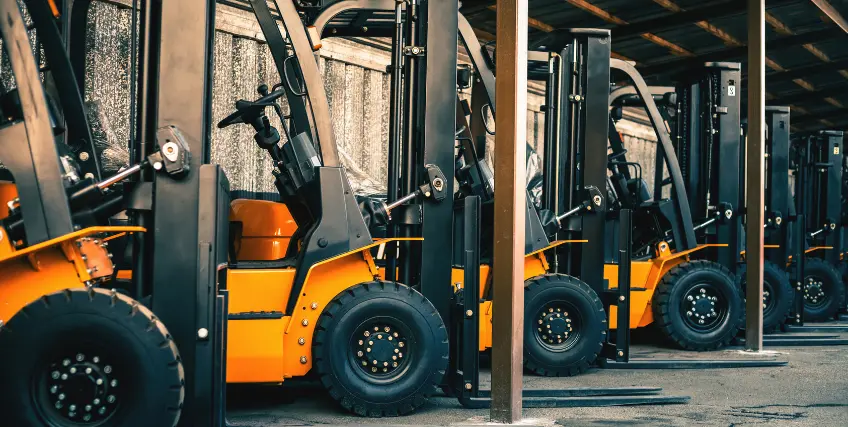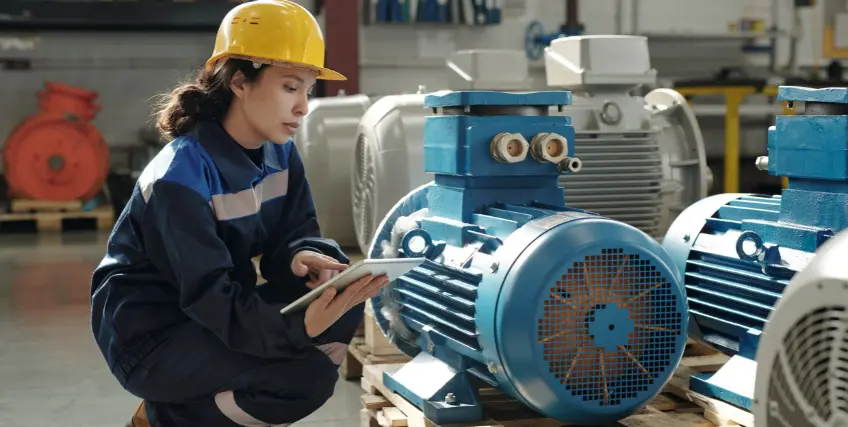Heavy Equipment Financing: A Guide for Construction Businesses
January 8, 2025 | Last Updated on: January 8, 2025

If you have a construction business, excavation company, or remodeling firm, you may consider buying machinery or equipment for your business. Construction equipment like bulldozers, loaders, and excavators can be expensive, so finding the right heavy equipment financing is essential. The equipment serves as collateral to secure business equipment loans, so they often offer lower interest loans and looser underwriting than unsecured loans. Learn more about business equipment loans, how to compare equipment financing companies, and what you need to apply for equipment financing.
What is Heavy Equipment Financing?
Heavy equipment financing is when you borrow money to purchase or lease heavy equipment. There are many different types of construction equipment, including bulldozers, excavators, skid steer, loaders, forklifts, tractors, and other large construction vehicles.
Equipment financing companies provide companies and entrepreneurs with the ability to finance heavy equipment for their businesses. This specialized type of financing is different from an SBA loan, line of credit, term loan, or other types of loans. Since unsecured bank loans usually have higher interest rates, heavy equipment financing is a more affordable option compared to other small business loans.
Construction Equipment Financing Options
Whether you're buying heavy machinery for job sites or equipment for your office, there are many small business equipment loan options available to you. Knowing your options can help you choose the best equipment financing for your business.
Heavy Equipment Financing
Heavy equipment financing is usually offered by large banks and equipment financing companies. Lenders specializing in this niche have expertise in how to value equipment and structure loans based on industry experience. They offer competitive rates and specialized financing programs catering to different industries and construction companies.
Traditional Bank Loan
Banks offer a variety of financing solutions, including loans to purchase equipment. While you can walk into a bank branch to apply for a loan, heavy equipment financing is a unique loan product that not all banks offer. If your bank offers these types of loans, they typically have higher credit score requirements than equipment financing companies specializing in these products.
SBA Loan
The Federal government encourages banks to lend to small business owners by guaranteeing loans made through the Small Business Administration (SBA). SBA loans can be used to buy equipment, start a business, purchase a building, and obtain working capital. A 504 loan is the best option when making a large-scale investment in major assets like heavy equipment purchases.
Lease
A lease is a financing option where equipment financing companies maintain ownership of the asset throughout the loan term. Monthly lease payments are similar to renting equipment, yet they're typically much lower than traditional loan payments. At the end of the lease, you can return the equipment or pay the residual to own the equipment.
Alternative Financing
Business owners can use customer payments to secure a lump sum of cash to pay for their heavy equipment. While these loans are secured by your income, they are not tied to the equipment. This enables you to use the money to buy equipment, cover payroll, or pay any other bills you may have. Alternative financing options like merchant cash advance are typically easier to get approved for than a traditional bank loan, which makes them ideal for borrowers with low credit scores or fluctuating incomes.
Qualifying for Heavy Equipment Financing
To qualify for the best loan terms and interest rates on heavy equipment financing, you must prepare your credit score and business financial statements. Here are several of the factors you should focus on before starting the equipment financing application process.
- Annual Revenue. Lenders use your revenue and profitability to gauge your ability to pay back its heavy equipment loan. Business owners with high profits and a history of revenue growth are ideal candidates for heavy equipment financing.
- Cash Flow. Cash flow is a cash movement as your business receives and spends its money. Positive cash flow is essential to show that you can repay the loan.
- Type of Industry. Lenders evaluate the type of industry you're in when making loan decisions. Certain industries have greater risks of business failures than others, so lenders want to include these risks in their loan pricing.
- Business History. Having a long track record of success makes a lender feel more comfortable in lending to you. Even if your business is a startup, having experienced owners and executives can lend the credibility and confidence the lender needs to approve your loan.
- Down Payment. Down payments are the amount of money you pay toward the purchase price of heavy machinery or other assets. This reduces the amount of money you must borrow and the risk of defaulting on the lender.
- Credit Score. Credit scores are a calculation of your credit history, amounts owed, and other factors that indicate your level of risk. A higher credit score can reduce your loan's interest rate and increase the likelihood of your loan being approved.
Equipment Financing vs. Equipment Leasing: Which is Better?
While equipment financing usually refers to a loan to acquire a piece of equipment, equipment leasing is another option for your business. Choosing between the two usually entails considering the best option for your business.
Heavy equipment financing is used when you want to own the asset at the end of the loan term. Machinery and heavy equipment often retain a high fair market value for many years. When you no longer need the equipment, you can sell it to recoup part of your investment.
In some cases, equipment leasing makes more sense for your small business. Similar to a loan, you make a monthly lease payment on an agreement for heavy equipment leasing. This agreement lets you rent a piece of heavy equipment for a certain amount of time before needing to return, buy, or re-lease it.
Fundamentally, a lease option might make the most sense for the unique needs of your business if the heavy equipment depreciates quickly. It also makes sense when you want to replace your heavy equipment with a newer, larger, or different type of equipment at the end of the lease term.
Equipment financing and equipment leasing can help your construction company have flexibility in acquiring heavy equipment for business purposes. If you want to own a piece of equipment, equipment financing is the best option for you. However, equipment leasing is the best choice when you want the flexibility to replace equipment frequently.
How to Apply For Equipment Financing
Follow these steps to learn how to apply for heavy equipment financing.
Determine What Your Business Needs
First, you should determine what your small business needs when it comes to heavy equipment. One of the largest considerations is how often you will need to use heavy equipment. Being able to amortize the cost of the equipment over many contracts helps to reduce the impact on your financials.
For example, you may have a contract that requires a specific type of heavy equipment to complete the job. Can you expect to receive these types of contracts regularly, or is this a one-time situation? If this is a one-off situation, a short-term lease or rental might be preferable to a small business equipment loan.
Understand Your Credit Score
Review your credit score and take steps to improve it. Your credit score will affect your interest rate and the terms that you are offered. Having a credit score that is too low may cause your application to be denied.
If you have some time before applying for an equipment financing loan, try to improve your credit score. Making all payments on time and avoiding unnecessary credit applications will help your credit score in the long run. Reducing your credit utilization ratio is the quickest way to boost your credit score. Pay down all credit card balances to below 30% of their credit limit and pay off as many as you can to reduce your debt-to-income ratio.
For borrowers with credit scores under 600, online alternative lenders may be your best option. Making a larger down payment or requesting a shorter repayment term can also help to secure a lower interest rate and increase your approval odds.
Find the Equipment Financing Amount Which is Best for You
Having a larger down payment will reduce the amount you need to borrow. Lower loan amounts increase the chances of approval and result in more manageable monthly payments.
When considering how much to spend on equipment financing, you should think about your other capital deployment goals within your business. If there are upcoming ventures, big expenses, or other financial obligations that you need to meet, taking on more financing might be a better option. Yet, if you have a lot of cash on hand without a lot of major expenses, putting as much money upfront toward equipment financing as you can would be a great idea to reduce future expenses for your business.
Apply for Equipment Financing
Once you know the lender you want to finance with, apply through their application and wait for an answer.
Each lender will require different documents from you and your business, but most want a basic set of documents that include your most recent tax returns, bank statements, and year-to-date income statement and balance sheet.
Keep in mind that processing speeds for your heavy equipment financing loan will vary based on the lender that you go with. Traditional lenders like banks take longer processing times. Online or alternative lenders may be able to provide quicker approvals for your equipment financing needs.
Costs of Equipment Financing
If you are considering heavy equipment financing, it is important to understand the costs involved.
- Speed of Financing. Heavy equipment financing typically offers a quicker process compared to other types of loans because of the simplified underwriting process involved
- Interest Rates. Heavy equipment financing is an affordable option for your business. Interest rates can range widely, but they typically fall between 9% and 30%, based on the asset and your creditworthiness.
- Term Length. The repayment term impacts the size of your monthly payment. Longer terms are usually associated with companies that have higher credit scores and a successful track record.
- Loan Amount. While some lenders may offer 100% financing, making a larger down payment can reduce your monthly payment and increase your approval odds. Large monthly payments can impact your cash flow and ability to get approved for other loans.
The Bottom Line
Heavy machinery and equipment are large investments that typically require heavy equipment financing to buy them. Your business can get the equipment it needs by taking out a loan, signing a lease, or using alternative financing. Many factors affect your ability to get approved, including the type of equipment, your credit score, business profitability, and how long you've been in business. If you're having trouble getting approved, consider speaking with an alternative lender who can offer other types of loans to help you get the cash you need.
Frequently Asked Questions (FAQs)
How Hard Is It to Get Heavy Equipment Financing?
Getting approved for heavy equipment financing is easier than you think. Lenders may approve business owners with credit scores as low as 600. However, other factors are considered, such as the type of equipment and your profitability, when underwriting the loan.
What Credit Score Do You Need to Finance Heavy Equipment?
Most lenders require a credit score of at least 600 to approve business equipment loans. However, some lenders may offer equipment financing to borrowers with credit scores down to 500. Keep in mind that lower credit scores often come with unfavorable loan terms, such as higher origination fees and interest rates.
What Are Typical Terms for Equipment Financing?
Equipment financing companies offer different loan terms depending on whether you're taking out a loan or a lease. Loan terms typically range from one to ten years, while lease terms often last for three, seven, or ten years. Down payments, interest rates, and other loan terms may vary based on your credit score, loan amount, type of equipment, and your personal and business financials.
Can You Finance Heavy Equipment With Bad Credit?
Yes, you may be able to get approved for equipment financing with credit scores as low as 500. Since heavy equipment financing is secured by a valuable asset, lenders are often focused on the loan collateral just as much as the borrower's credit and financials.
Do Equipment Loans Require a Down Payment?
Equipment loans often require a down payment of 10% to 20% of the purchase price, but some lenders offer 100% financing. The down payment varies on many factors, including the loan amount, equipment type, credit score, and whether it is a loan or a lease. Before buying equipment, shop around for the best interest rates and loan terms that match your financing needs.




